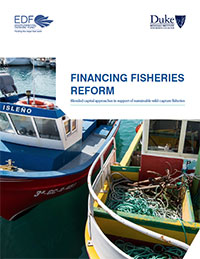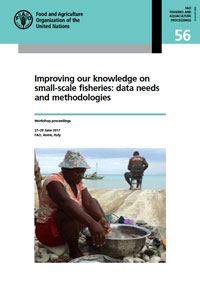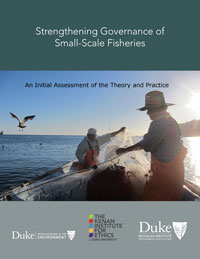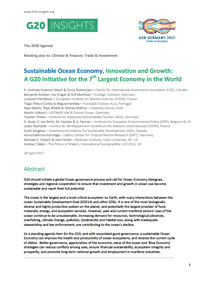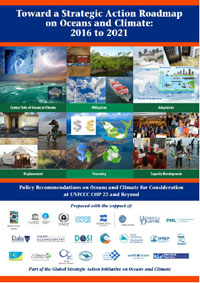Publications
Financing Fisheries Reform: Blended Capital Approaches in Support of Sustainable Wild-Capture Fisheries
Many fisheries around the world are considered an economically underperforming asset—providing lower returns than they could be if more sustainably managed. This report, co-authored by researchers at the Environmental Defense Fund and the Nicholas Institute for Environmental Policy Solutions, introduces the idea of a blended capital approach to fill the all-too-common finance gap that may hamper recovery of many fisheries. The report describes the categories of investment required to attain fisheries sustainability at each stage of the recovery process, identifies where within this framework there is likely to be the biggest funding gap, and suggests possible approaches for philanthropic and public capital to leverage private capital to help fill the gap.
Improving our Knowledge on Small-Scale Fisheries: Data Needs and Methodologies
Small-scale fisheries play an important role in contributing to food security, nutrition, livelihoods and local and national economies. However, there is often limited data and information available on their contributions, and hence small scale fisheries tend to be overlooked and marginalized in policy processes, leading to low levels of support for the sector. This proceedings provides a summary of the presentations, discussions, conclusions and recommendations of the “Workshop on Improving our Knowledge on Small-Scale Fisheries: Data Needs and Methodologies,” held at the Food and Agriculture Organization of the United Nations headquarters in Rome, Italy, in June 2017. Through the workshop, it was determined that a comprehensive new study to illuminate the hidden contributions of small-scale fisheries to the three dimensions of sustainable development, as well as identification of key threats to these contributions was needed.
Tuna Fisheries: Pacific Possible Background Paper No. 3
This World Bank paper outlines a best-case scenario whereby improved management of tuna fisheries allows Pacific Island countries to gain as much as US$344 million per year in additional sustainable revenues and create 7,500 to 15,000 jobs by 2040. The paper recommends five policy strategies: increased regional integration, efficient fishing practices and catch limits, flexible access and harvest rights for fleets, investment in skills and labor, and inclusion of coastal communities in fisheries planning. The paper builds on work undertaken by the Forum Fisheries Agency and the Pacific Community through the Regional Roadmap for Sustainable Pacific Fisheries, which was endorsed by Pacific Island Forum leaders in 2015. It is part of the World Bank’s Pacific Possible series, which explores potentially transformative opportunities for Pacific Island countries that warrant further research, understanding, and policy action. The paper's results are summarized in Pacific Possible: Long-Term Economic Opportunities and Challenges for Pacific Island Countries.
Adaptations to Maintain the Contributions of Small-Scale Fisheries to Food Security in the Pacific Islands
In several Pacific Island countries and territories, rapid population growth and inadequate management of coastal fish habitats and stocks is causing a gap to emerge between the amount of fish recommended for good nutrition and sustainable harvests from coastal fisheries. The effects of ocean warming and acidification on coral reefs, and the effects of climate change on mangrove and seagrass habitats, are expected to widen this gap. To optimise the contributions of small-scale fisheries to food security in Pacific Island countries and territories, researchers write in the journal Marine Policy that adaptations are needed to minimise and fill the gap and they outline policies needed to support lists of key recommended adaptations.
Strengthening Governance of Small-Scale Fisheries: An Initial Assessment of the Theory and Practice
Small-scale fisheries (SSFs), most of which are found in developing countries, have been poorly measured at a global level, and they have often been ignored in states’ policy making—yet estimates suggest their aggregate global contribution to nutrition, food security, and poverty eradication is massive. These fisheries face multiple conflicts over space and resources—conflicts that scholars now believe can be mitigated with interactive governance or ecosystem-based management. However, there is little consensus in the literature on how local conditions affect linkages between desired outcomes and different forms of SSF governance. A diverse group of organizations provide support to SSF governance but that support varies and worldwide is likely to be relatively small. Another challenge is achieving SSF governance reform at the scale of ecosystems or value chains. Through surveys and a global workshop, practitioners were asked how they would approach this challenge. This report describes their recommendations.
Sustainable Ocean Economy, Innovation, and Growth: A G20 Initiative for the 7th Largest Economy in the World
The authors of this G20 Insights policy brief say that the G20 should initiate a global ocean governance process, and they call for ocean economy dialogues, strategies, and regional cooperation to ensure that investment and growth in ocean use become sustainable and reach their full potential. They note that the ocean is the largest and most critical ecosystem on Earth, with many interactions between the ocean Sustainable Development Goal (SDG14) and other SDGs. Though potentially the largest provider of food, materials, energy, and ecosystem services, the ocean is stressed by increasing demand for resources, technological advances, overfishing, climate change, pollution, biodiversity, and habitat loss. Moreover, inadequate stewardship and law enforcement are contributing to the ocean’s decline. As a standing agenda item for the G20, and with associated good governance, a sustainable ocean economy can improve the health and productivity of ocean ecosystems.
Blue Carbon Financing of Mangrove Conservation in the Abidijan Convention Region: A Feasibility Study
Coastal vegetated ecosystems have long benefited coastal communities and fisheries, and in recent years have been recognized internationally for their significant capacity to sequester and store carbon (“blue carbon”)—at rates that surpass those of tropical forests. Yet these ecosystems are being converted rapidly. Current annual mangrove deforestation has been estimated to emit 240 million tons of carbon dioxide. For this reason, financing mechanisms to pay those tropical countries that have significant blue carbon resources to reduce greenhouse gas emissions from deforestation have been explored as a means to fund mangrove conservation. This report by the United Nations Environment Programme, the Abidjan Convention Secretariat, and GRID-Arendal explores the potential of international carbon finance mechanisms to help fund mangrove conservation along the coast of West, Central, and Southern Africa that is covered by the Abidjan Convention and examines the scale of economic benefits that this conservation might provide for the region, including benefits not always recognized in traditional assessments or valuations.
Making Sure the Blue Economy is Green
Given the growing and seemingly limitless capacity to industrialize the oceans, there is a need to reimagine how to effectively measure, monitor and sustainably manage this seventy-one percent of the Earth's surface. In a commentary for the journal Nature Ecology and Evolution, the Nicholas Institute's John Virdin and co-authors write that we are now at an inflection point in history, where we no longer look to the ocean solely for protein and waterways, but also as a source for many more aspects of our increasingly industrialized society. While much of our focus has been terrestrially based where impacts are easier to identify, the authors write, greater attention is needed on the industrialization of our oceans, which have long been considered as a source of inexhaustible resources and reservoirs for unwanted terrestrially generated waste.
North Carolina’s Ocean Economy: A First Assessment and Transitioning to a Blue Economy
North Carolina’s ocean and coastal areas and their resources shape a unique and important segment of the state’s economy, particularly for its eastern region. From seafood and commercial fishing opportunities, to access to global markets through shipping and transport, and finally tourism and recreation, thousands of jobs and billions in revenue for the state depend on the ocean and coast. Yet to date, this segment of North Carolina’s economy has not been identified as a discrete contributor in the state. This working paper provides a first assessment of the existing information available to measure the size and extent of North Carolina’s ocean economy, and proposes next steps to transition to a blue economy.
Toward a Strategic Action Roadmap on Oceans and Climate: 2016 to 2021
This comprehensive set of policy recommendations on oceans and climate for consideration at the United Nations Framework Convention on Climate Change 22nd Conference of the Parties and beyond is aimed at recognizing the central role of oceans in climate and the need to implement stringent reductions in greenhouse gas emissions to avoid disastrous consequences for coastal and island communities, marine ecosystems, and ocean chemistry. The recommendations from the International Expert Working Group on Oceans and Climate address mitigation, adaptation, displacement, financing, and capacity development.

